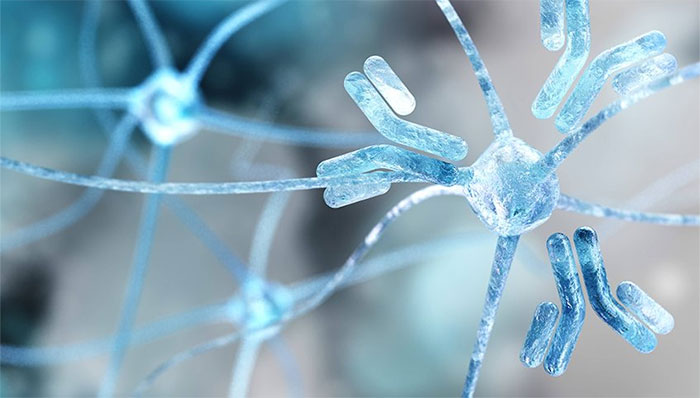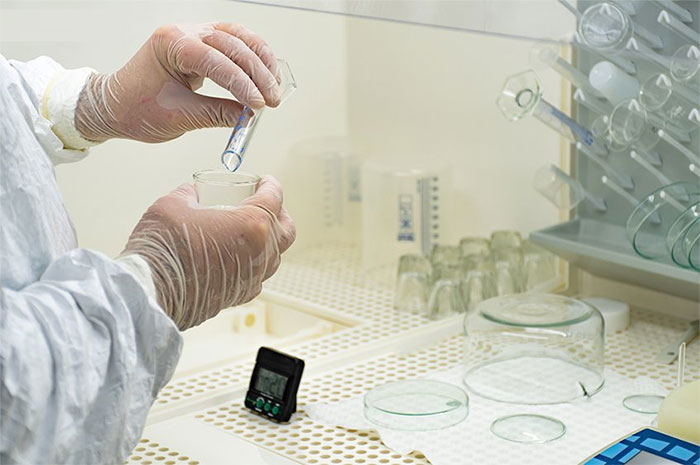Monoclonal antibodies are considered a type of “instant vaccine” that delivers pre-formed antibodies into the body, producing an immune response within just a few hours. AstraZeneca’s monoclonal antibodies are expected to be a new hope for the prevention and treatment of Covid-19 in Vietnam. So, what are monoclonal antibodies, how are they produced, and what are their benefits and potential side effects?
What You Need to Know About Monoclonal Antibodies
What are monoclonal antibodies?
Monoclonal antibodies are antibodies created in a laboratory, derived from a single B cell line, and have a high affinity for a specific antigenic determinant (epitope) of a pathogen. Monoclonal antibodies function similarly to natural antibodies in the body:
- Neutralize pathogens, preventing them from entering healthy cells.
- Opsonize antigens to aid in phagocytosis.
- Support antibody-dependent cellular cytotoxicity.
- Activate the complement system.
Additionally, monoclonal antibodies are also used in diagnostic tests such as western blotting and immunohistochemistry.
Types of Monoclonal Antibody Drugs for Cancer Treatment
Several types of monoclonal antibody drugs are used to support the treatment of certain types of cancer, including:
- Naked monoclonal antibodies (Naked mAbs);
- Conjugated monoclonal antibody drugs (Conjugated mAbs);
- Bispecific monoclonal antibodies.
1. Naked monoclonal antibodies (Naked mAbs)
Naked monoclonal antibodies are those that are not linked to drugs or radioactive substances; instead, they act independently. Most naked monoclonal antibodies bind to antigens on cancer cells, although some may bind to antigens on non-cancer cells or free-floating proteins. Naked monoclonal antibodies can operate in various ways, including:
Some naked monoclonal antibodies enhance the body’s immune response against cancer cells by binding to them, simultaneously acting as signals for the immune system to eliminate these cancer cells. For example, the monoclonal antibody alemtuzumab is commonly used in the treatment of certain patients with chronic lymphocytic leukemia by binding to the CD52 antigen (found on lymphocytes), attracting immune cells to destroy these lymphocytes. Other naked monoclonal antibodies enhance the human immune response by focusing on critical points in the immune system.
Other naked monoclonal antibodies work by binding to and blocking antigens on cancer cells or nearby cells. For instance, trastuzumab targets the HER2 protein found on the surface of breast or gastric cancer cells. When the HER2 protein is activated, it promotes the growth of cancer cells. Using trastuzumab will bind to HER2 proteins and prevent their activity.
2. Conjugated monoclonal antibody drugs (Conjugated mAbs)
Conjugated monoclonal antibodies combine with therapeutic chemicals or radioactive compounds to deliver these substances directly to cancer cells. The monoclonal antibodies circulate throughout the body until they find and attach to the target antigen, subsequently delivering therapeutic agents to the necessary location. This approach aims to minimize the adverse effects of cancer treatments on other normal cells in the body. Specifically:
Antibodies labeled with radioactive isotopes: These are antibodies attached to small radioactive particles, such as Ibritumomab tiuxetan (Zevalin) – an antibody that targets the CD20 antigen on B lymphocytes. The antibody carries the radioactive particles to cancer cells.
Chemically labeled antibodies: These conjugated monoclonal antibodies are linked to high-dose chemotherapy drugs, such as Brentuximab vedotin (Adcetris). An antibody targeting the CD30 antigen on lymphocytes is attached to the chemotherapy drug MMAE. Alternatively, Ado-trastuzumab emtansine, which targets the HER2 protein, is linked to the chemotherapy drug DM1.
3. Bispecific monoclonal antibodies
Bispecific monoclonal antibodies are formed from parts of two different monoclonal antibodies and can simultaneously bind to two different proteins. For example, the monoclonal antibody Blinatumomab is used to treat certain leukemias. One part of this monoclonal antibody binds to the CD19 protein commonly found on some lymphatic cancer and leukemia cells, while the other part binds to the CD3 protein typically found on T cells. By linking the two types of proteins CD19 and CD3, Blinatumomab brings immune cells and cancer cells together, enabling the immune system to destroy the cancer cells.

Monoclonal antibodies are primarily used in the fields of oncology, rheumatology, hematology, and most recently for the prevention and treatment of Covid-19.
Monoclonal Antibody Drugs for Covid-19 Treatment
The bodies of individuals recovering from Covid-19 produce antibodies against the SARS-CoV-2 virus, which can last for 5-7 months post-infection. However, scientists can also produce these antibodies in the laboratory and administer them to patients.
Specifically, the genome of the SARS-CoV-2 virus encodes four main structural proteins: spike protein (S), membrane protein (M), envelope protein (E), nucleocapsid (N), along with accessory proteins and non-structural proteins. The spike protein S has two subunits, S1 and S2, which facilitate the virus’s attachment to the membrane and entry into host cells via the ACE2 receptor. Monoclonal antibodies targeting the S protein are used to treat Covid-19. Research indicates that monoclonal antibodies play a role in preventing SARS-CoV-2 infection.
Evusheld Antibody Cocktail
The Evusheld antibody cocktail is a combination of two long-acting monoclonal antibodies, tixagevimab (AZD8895) and cilgavimab (AZD1061). Compared to traditional antibodies, Evusheld has been optimized using AstraZeneca’s proprietary technology, resulting in a threefold increase in half-life and the ability to provide protection for up to 12 months with just one intramuscular injection. Additionally, this modification allows Evusheld to concentrate at high levels in the mucosal membranes of the nasopharynx, reducing the risk of immune-related conditions such as antibody-dependent enhancement of disease.
Results from the Phase III outpatient TACKLE trial (n=903) demonstrated that Evusheld monoclonal antibodies reduced the risk of progressing from mild to moderate Covid-19 to severe disease or death (from any cause) compared to placebo. According to Phase III clinical trial results, Evusheld reduced the risk of symptomatic Covid-19 by 83% and by 88% if administered within three days of symptom onset. The latest preclinical data indicate that the combination of tixagevimab (AZD8895) and cilgavimab (AZD1061) maintains neutralizing efficacy against the globally concerning Omicron variant.
Currently, the FDA has approved the emergency use of the Evusheld monoclonal antibody for pre-exposure prophylaxis. AstraZeneca is filing for FDA approval for outpatient treatment of Covid-19.
How are Monoclonal Antibodies Produced?
Unlike polyclonal antibodies produced by various blood cell lines that can bind to multiple different epitopes; monoclonal antibodies have a single affinity that binds only to the specific epitope they recognize.
The basic process for producing monoclonal antibodies is as follows:
- Scientists conduct experiments by injecting antigens into mice, then isolating spleen cells capable of producing antibodies against that antigen.
- By fusing these spleen cells with immortal myeloma cells to create hybrid cells that can produce antibodies and replicate indefinitely.
- Then, the cell lines (clones) are screened and selected based on antigen specificity and antibody subclass.
- The selected cell line is cultured, produced in large quantities, and the antibodies are extracted.

Monoclonal antibodies are produced by injecting antigens into mice, followed by isolating spleen cells capable of producing antibodies against that antigen.
What Effects Do Monoclonal Antibodies Have?
Monoclonal antibody therapies are not new; these antibodies have been used in the treatment of:
- Cancer: Monoclonal antibodies specifically bind to cancer cell antigens, triggering an immune response against target cancer cells.
- Autoimmune Diseases: Some monoclonal antibodies used for autoimmune diseases include: Infliximab and adalimumab for rheumatoid arthritis, chronic inflammatory bowel disease, ankylosing spondylitis, and ulcerative colitis, due to their ability to bind and inhibit TNF-α. Basiliximab and daclizumab inhibit IL-2 on activated T cells, thus helping to prevent acute rejection in kidney transplants. Omalizumab inhibits immunoglobulin E (IgE) in humans and is extremely useful in treating moderate to severe allergic asthma.
- Viral Infections: This includes several monoclonal antibodies such as: bavituximab, casivimab, palivizumab, imdevimab, etc.
- Application in Covid-19 Treatment: The bodies of most people recovering from Covid-19 produce antibodies against the SARS-CoV-2 virus. According to scientists, these antibodies persist for at least 5 to 7 months after infection.
Do Monoclonal Antibodies Cause Any Side Effects?
Monoclonal antibodies have been used in medicine for a long time. As of 2019, the FDA has approved over 80 monoclonal antibodies, primarily used in the fields of oncology, rheumatology, and hematology. Possible side effects of monoclonal antibodies include: fever, chills, headaches, nausea, vomiting, and rashes.
For the monoclonal antibody Evusheld, safety data has been tested on over 7,000 individuals through three Phase 3 trials: PROVENT (5,197 people), STORM CHASER (1,129 people), and TACKLE (903 people).
In the PROVENT pre-exposure prophylaxis trial, adverse events were nearly equivalent between the two groups, with rates of 35.3% in the Evusheld group and 34.2% in the placebo group. Only 1 out of 3,461 individuals experienced an anaphylactic reaction. There was only one case of an adverse event that led to discontinuation of the drug in the AZD7442 arm, which was not related to the medication.
In the context of Covid-19 still threatening the lives of millions worldwide, scientists have dedicated significant effort and resources to researching the latest and most effective methods to prevent and treat Covid-19. Among these new methods, the monoclonal antibody Evusheld is viewed as a beacon of hope to bring an end to the pandemic.


















































